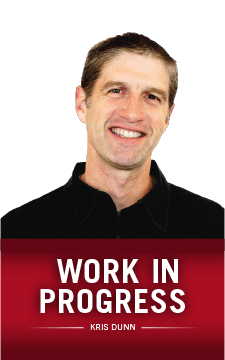Jay Fortuna, a 2017 winner of Workforce’s Game Changer Award, is now the head of learning & development at FinTech company Rewards Network. As someone who’s been recognized for his achievements in human resources, Fortuna answered some questions for Workforce.com about his career path in L&D, the latest trends and innovations in HR and advice he would give his younger self.
Also read: How technology fits into an HR manager’s job description
Workforce: How have you grown professionally over the course of your career?

Jay Fortuna: I have been incredibly fortunate in a career where I have often been given the chance to raise my hand to take on more. Because of this, I have had the opportunity to take on the philosophy of being a life-long learner as it needed to yield results quickly.
I graduated college with a marketing degree and knew that it wasn’t the exact niche inside the business world where my passion truly was. I spent the early part of my career working hard to make chances and opportunities present themselves around learning and development.
WF: How has your career changed?
Fortuna: I was provided with an opportunity early in my career to move from sales into L&D, and I have not looked back since. I entered the L&D world as a facilitator and continued in that role in some capacity for years while I worked hard to master instructional design and transform into the leader I am today. Because of my willingness to learn more and make myself better I have been afforded the opportunity of becoming a well-rounded learning professional and because of my success while doing so I have been able to elevate in my career at an accelerated pace.
WF: What are some of the trends you’ve seen in HR over the past few years?
Fortuna: Over the past decade or so the biggest transformation — [other than] the continued growth of the use of technology, which will always be a constant — is recognition [of] that true and deep impact proper learning and development can have on the business. L&D has earned a seat at the table.
WF: What advice would you tell yourself five years ago?
Fortuna: In 2017 when I received the Game Changers award I was leading a small but mighty team, and we were attempting to change the landscape of an industry that had been struggling with organic growth for over a decade. At that point I didn’t think about anything else except accomplishing the goal in front of me and thinking about how I was going to attack the next five beyond it.
I wish I would have told myself then enjoy the moment and spend more time with the people that were there supporting me. I have always had a “Superman mentality” and because of it I missed out on some chances to enjoy the successes.
WF: What have you learned over the course of your career in HR?
Fortuna: The most valuable lessons I have learned over my career in HR are to be willing to raise your hand and never underestimate your ability to make an impact. Being willing to raise your hand for a project, even though you may have never done it before, will allow you to live the concept of being a life-long learner. When you are forced to learn a new skill on your accord, you often look at the task differently. It becomes a growth opportunity versus a task which was demanded of you.
WF: What do you foresee in the future of HR?
Fortuna: With the changes in learning happening so fast, I foresee the future of learning to continue [its] rapid shift to just-in-time learning. This type of learning mixed with programs designed with hyper job focus could make it possible to get learners to a point of proficiency at an unprecedented accelerated rate. When you take these two approaches and properly mix them with blended learning, the sky’s the limit.


 Khalid Raza
Khalid Raza
 The dirty little secret of HR is that most of us didn’t have a master plan to end up managing people functions and maximizing human capital ROI inside the modern workplace. We grew up with bigger dreams, which is cool because no one grows up dreaming of being a director of account management, financial analyst or marketing manager, either.
The dirty little secret of HR is that most of us didn’t have a master plan to end up managing people functions and maximizing human capital ROI inside the modern workplace. We grew up with bigger dreams, which is cool because no one grows up dreaming of being a director of account management, financial analyst or marketing manager, either.